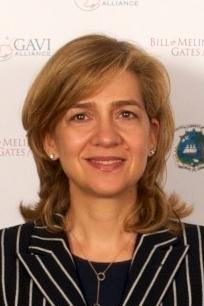Accusations come a time when Spain’s royal family is facing a historic popularity crisis

By David_Cameron,_Andrew_Mitchell,_Bill_Gates_and_Ellen_Johnson-Sirleaf,_together_with_members_of_the_GAVI_board_(2).jpg: DFID – UK Department for International Development derivative work: FishInWater [CC-BY-2.0 (http://creativecommons.org/licenses/by/2.0)%5D, via Wikimedia Commons
WASHINGTON
Led by Judge Jose Castro based in Palmas de Mallorca and supported by the activist anti-corruption group Clean Hands (Manos Limpias), a Spanish court has ordered the princess to answer allegations of tax fraud and money laundering.
The charges against the princess are in connection with her husband Inaki Urdangarin’s alleged misappropriation of public funds through a nonprofit foundation, the Noos Institute, which secures contracts with regional governments to organize sporting events.
An Olympic medalist and Duke of Palma (a title he was granted in 1997 when he married the princess), Urdangarin has been facing charges of embezzlement in connection with the Noos Institute since 2011.
Princess Cristina, seventh in line for the throne, is accused of using funds misappropriated through the foundation to remodel her home in Barcelona and purchase theater tickets and other gifts. She is also accused of failing to report these sums in her income statements.
“These sums were used on strictly personal spending…And they should have been declared in income tax statements… But it is evident that neither Inaki Urdangarin nor Mrs. Cristina de Borbon ever did so, which means they repeatedly defrauded the tax authority,” wrote Judge Castro in his most recent ruling.
Both the princess and her husband have publicly denied charges through their attorneys. However, in December of 2011, the Duke of Palma was officially excluded from royal functions; later, his image in Madrid’s wax museum was moved away from the images of the royal family and placed among sports personalities, both attempts to distance him from the monarchy.
Judge Castro previously brought charges against King Juan Carlos’ youngest daughter in April of 2013, but the charges were subsequently dropped in May when a higher court, on prosecutorial appeal, found there was insufficient evidence against the princess.
The court did allow the judge to continue looking into alleged tax fraud by Princess Cristina and these new preliminary charges stem from his investigation. The princess is scheduled to appear before the court on March 8, but prosecutors are again to appeal the judge’s ruling.
Under Spanish law, judges and prosecutors run separate investigations and may disagree in their conclusions. In this case, the conflict between judge and prosecutors will once again automatically return the issue to the higher court—the same court that dropped the charges for insufficient evidence last year.
Should the court, made up of a panel of four judges, decide against the princess and allow the case against her to proceed, it will be the first time in Spanish history that a royal-born, senior member of the royal family will be forced to appear in court.
Regardless of whether the charges against the princess are ultimately dropped, the case has come as another major blow to the royal family’s declining popularity.
According to royal analysts, this latest scandal may be deciding factor in favor of abdicating for Spain’s 76-year-old king, recently beset by a series of health issues.
Once thought of as one of the most popular monarchs in Europe, after 38 years on the throne King Juan Carlos’ reputation has suffered devastating blows in the past years.
The Spanish public was outraged in 2012, when pictures surfaced of the king with an elephant he had shot on a lavish safari in East Africa amid the height of Europe’s economic crisis, when the unemployment rate in his country soared to around 25 percent and Spaniards were facing harsh austerity measures.
A poll published Sunday in Spain’s “El Mundo” newspaper revealed that 62 percent of the country believes that the king should abdicate in favor of his son, Prince Felipe. The poll also revealed that the king’s popularity dropped nine percent in the last 12 months.
“Cristina is seen as being close to the king; her problems are the king’s problems,” Lars Hovbakke Sørensen, a lecturer in European royalty at the University of Copenhagen, told the Daily Beast. “I wouldn’t be surprised, if King Juan Carlos chooses to resign in the coming months, and hands over the throne to Crown Prince Felipe in an attempt to save the monarchy.”
According to the poll by “El Mundo,” 66 percent of Spaniards have a favorable opinion of the prince.
